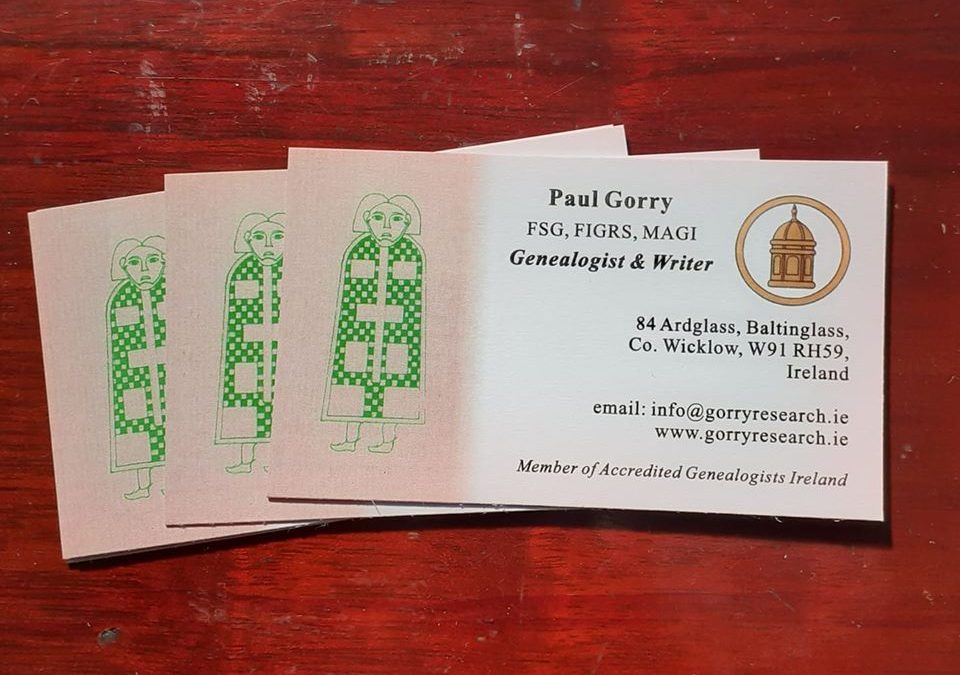I haven’t been in a record repository for over two months. That hasn’t happened to me since the mid-1980s, when I took six months off to supervise a parish register indexing project. Even then I managed the odd trip to Dublin to feed my habit. Right now I’m blessed to have more than enough work to do at home, but soon I will start to crave the atmosphere of buildings that envelop you in traces of the past. The Registry of Deeds is my spiritual home, but any of the familiar libraries or archives would be a joy to visit in the near future. Meeting friends and acquaintances, staff members and fellow researchers, people I’ve known for decades – there is so much more to visiting a record repository than the records and the architecture.
Covid-19 has paused life and it has had an impact on genealogy in so many ways, some of which will only be apparent in decades to come. It has brought families together, at a distance, like nothing else has done in a long time. Most people are at leisure to talk remotely to parents, children, siblings and cousins. Family quizzes via video conferencing have become a phenomenon of the pandemic. I was talking to a man the other day who was telling me of the enjoyment he gets from his family’s weekly quiz, for which his children and grandchildren in Ireland and the USA get together. Two of his grandchildren, separated in age by a year but geographically by hundreds of miles – living in Colorado and Massachusetts, now chat familiarly and are getting to know their cousins in Ireland as well. In half a century today’s Great Isolation will be remembered by many as a time that created family ties.
Genealogical organisations in this part of the world also are seeing changes. I’ve attended council meetings of two such bodies recently on Zoom. One usually has its meetings in London and the other in Dublin. The London-based society has council members living in Australia, England, Ireland and Scotland. Its first two Zoom meetings had almost full attendance. The Dublin-based organisation is contemplating its first online CPD event. Of course, online events aren’t unusual for many in genealogy, with the likes of the Virtual Genealogical Association leading the way with webinars. But many of us have been slow to follow. Online meetings and webinars may well become the norm even if and when social distancing is consigned to history.
Covid-19 has imposed working from home on office dwellers all over the world, temporarily at least. This may be a welcome development for many, or possibly most. For professional genealogists, in general, there’s nothing new in this – we do much of our work this way in any case. Most professionals have a fairly extensive personal reference library as well as online resources to help in responding to enquiries. Report writing, dealing with email enquiries and corresponding with clients have been at-home tasks for most self-employed genealogists for decades. More recently the balance of research work between record repositories and online resources has swung sharply in favour of the latter. Had this pandemic happened ten or more years ago, things would have been different, for Irish genealogists anyway. Now we can do much of our research online.
‘So can your potential clients’, I hear you say! Indeed they can, but having sources available to you and knowing how to use them efficiently and effectively are two very different things. Some people who become clients are uncomfortable with technology. Others enthusiastically begin researching online and get stuck. Others get a certain distance and realise they need help. Others are long-term family historians who need advice or research in records unavailable to them.
In 1999, when I moved back to my home town of Baltinglass, after twenty years living in Dublin, I had to travel to the city two or three times a week for research. About twelve years ago a gradual change began, when the first significant Irish genealogical records went online. Now my trips to Dublin are spasmodic, but maybe once a week.
One thing I normally travel there for is the Genealogy Advisory Service (GAS) at the National Archives. This service, free to the public, is run by a panel of Members of Accredited Genealogists Ireland (AGI) on behalf of the National Archives. AGI is the organisation from which I hold my credentials. Since 2003, with one short break, AGI has been engaged by the Archives to provide this service. There is one accredited genealogist on duty each day, and I do two or three days’ duty per month. I was to be on duty on Friday 13 March, an ominous date, but that day the Archives closed due to Covid-19 and it has remained closed for the past two months.
As every good family historian knows, Invention’s mother’s name was Necessity. As a temporary measure, the National Archives decided to provide an alternative GAS by email. On Wednesday 1 April, another choice date, I had the honour and pleasure of being the first AGI Member on duty for this new venture. It’s not ideal, as at the real face-to-face GAS there is interaction with the enquirer and it’s much easier to explain the processes. Nonetheless, the email GAS is proving popular and we advisors are getting used to its quirks. It’s strange how the mind works: though I know I do the email GAS at my kitchen table, on other days I still picture my on-duty colleague sitting in the GAS room in the Archives.
This email service, with an accredited genealogist on hand to advise you, is yet another way that the world of genealogy is adapting in the time of Coronavirus. Already I’ve seen it being copied in principle by a commercial company and a genealogy magazine. We in AGI appreciate the flattery!

